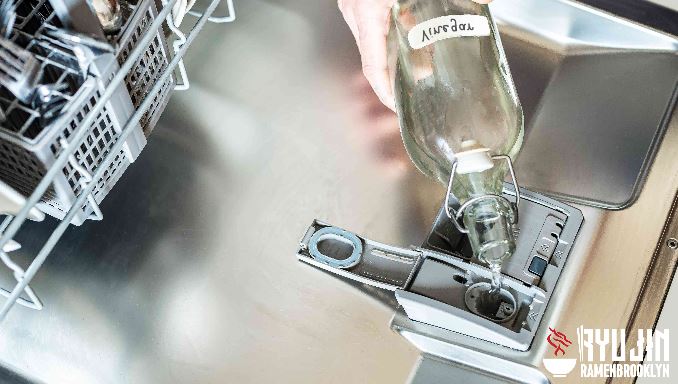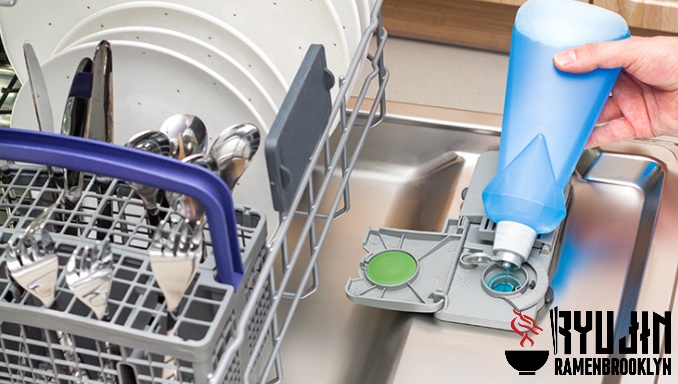What Can I Use Instead of Rinse Aid?

Dishwasher rinse aid is a concentrated surfactant designed to reduce the surface tension of water, promote rapid wetting and dispersion of soils, and improve dishwashing efficiency. It is typically used in low concentrations, between 0.1% and 0.5%. But what can I use instead of rinse aid If they run out?
One of the most common questions we hear from our customers is what can I use instead of rinse aid. While many people assume that there is no alternative, there are several options you can use depending on your preferences and needs. In this blog post, we will discuss four substitutes for rinse aid and how to use them.
A dishwasher rinse aid is a product that helps to reduce water spots and streaks on dishes and glasses. It is added to the dishwasher’s rinse cycle and works by causing water to bead up and roll off surfaces rather than remaining stagnant and causing spots. Rinse aid also helps improve your dishwasher’s overall cleaning performance by preventing soils and detergents from redepositing on clean dishes.
There are several different brands and formulations of dishwasher rinse aid available on the market, so it is essential to read the labels carefully to find one that is compatible with your dishwasher and meets your needs. For example, some rinse aids are designed for complex water areas, while others are specifically formulated to prevent spots and streaks. In addition, some dishwasher rinse aids contain fragrances or other ingredients that can make your dishes smell fresh and clean.
When using a dishwasher rinse aid, it is essential to follow the manufacturer’s instructions carefully. In addition, you must add the rinse aid to the dishwasher’s rinse cycle. The amount of rinse aid you will need will vary depending on the type of product that you are using, so be sure to read the label carefully. It is also important to remember that rinse aid can build up over time, so it is essential to clean your dishwasher’s dispenser regularly to prevent clogs.
A dishwasher rinse aid is essential to getting your dishes clean and streak-free. By following the manufacturer’s instructions and using the product properly, you can ensure that your dishes look their best.
What Is Rinse Aid for Dishwashers Made from?
Rinse aid is a product that helps to prevent water spots and streaks on dishes and glassware by causing water to bead up and roll off of surfaces. It is typically made from distilled alcohols, surfactants, and polymers. Rinse aid is added to dishwasher detergent to increase its effectiveness in hard water conditions. Some dishwashers have a built-in dispenser for rinse aid, while others require the user to add it manually.
Rinse aid is essential in hard water areas because it helps to break down the mineral deposits that can build up on dishes and glassware. These deposits can cause spots and streaks, making it more difficult for water to rinse off of surfaces. Rinse aid also helps reduce the time that dishes need to be rinsed in the sink before they are placed in the dishwasher.
When using a rinse aid, following the manufacturer’s instructions for proper dilution and use is essential. Rinse aid should be added to the dishwasher’s detergent compartment before adding dishes. It is essential to avoid overuse of rinse aid, as this can cause streaking and spotting. Too much rinse aid can also cause dishes to come out of the dishwasher with a filmy residue.
What Can I Use Instead of Rinse Aid?
Rinse aid is integral to the dishwashing process, but it can be expensive and difficult to find in stores. However, several options are available if you’re looking for a cheaper or more natural alternative to rinse aid.
There are several substitutes for rinse aid that you can use depending on your needs. The most common substitutes include white vinegar, lemon juice, rubbing alcohol, and even hairspray.
White Vinegar
One of the most popular substitutes for rinse aid is white vinegar. White vinegar is an acidic substance that can help to break down grease and soap scum. It also can prevent hard water deposits from forming on your dishes. To use white vinegar as a rinse aid, add 1 cup of white vinegar to your dishwasher’s rinse aid dispenser.
Lemon Juice
Lemon juice is another popular substitute for rinse aid. Lemon juice is a natural disinfectant that can help break down grease. To use lemon juice as a rinse aid, add 1 cup of lemon juice to your dishwasher’s rinse aid dispenser.
Rubbing Alcohol
Rubbing alcohol is another option that you can use as a substitute for a rinse aid. Rubbing alcohol can help to break down grease and soap scum. It is also a natural disinfectant. To use rubbing alcohol as a rinse aid, add 1 cup of rubbing alcohol to your dishwasher’s rinse aid dispenser.
Hairspray
Hairspray is another option you can use as a substitute for rinse aid. Hairspray can help to break down grease and soap scum. It can also help to prevent hard water deposits from forming on your dishes. To use hairspray as a rinse aid, spray it onto your dishes before you load them into the dishwasher.
These are just a few of the most popular substitutes for rinse aid. If you’re looking for a more natural or cheaper alternative to rinse aid, plenty of options are available. Just read the labels carefully to find one compatible with your dishwasher that meets your needs.
A dishwasher rinse aid is essential in getting your dishes clean and streak-free. By following the manufacturer’s instructions and using the product properly, you can ensure that your dishes look their best.
Can I substitute vinegar for a rinse aid?
Yes, you can substitute vinegar for rinse aid, but you may need to use a little more than the manufacturer recommends. You can also add a little bit of lemon juice to help cut through any residue that might be left on your dishes.
Can I use dishwashing liquid instead of a rinse aid?
No, it would help if you did not use dishwashing liquid instead of a rinse aid. Dishwashing liquids remove grease and oils from dishes, while a rinse aid is designed to help prevent water spots and streaks on dishes.
If you use dishwashing liquid instead of rinse aid, your dishes may not come out as clean, and they may have water spots or streaks.
How to Make a Dishwasher Rinse Aid at Home
A dishwasher rinse aid is a product that helps remove spots and streaks from your dishes by reducing the surface tension of water. You can buy a dishwasher rinse aid at most supermarkets or online, but you can also make your own at home with just a few ingredients.
To make a homemade dishwasher rinse aid, mix 1 part white vinegar and 2 parts water in a spray bottle. Then, add 1 teaspoon lemon juice or rubbing alcohol to the mixture and shake well.
Spray your homemade dishwasher rinse aid onto dishes before you run the cycle, and you should notice a difference in how clean your dishes come out! You can also use this solution to clean your dishwasher’s spray arm and filter, which will help improve its performance over time.
Standard Rinse Aid vs Homemade Rinse Aid
While a homemade dishwasher rinse aid can be just as effective as a store-bought rinse aid, there are some key differences to keep in mind.
First, store-bought rinse aids often contain added ingredients like fragrances or colorants. If you have sensitive skin or allergies, these ingredients could irritate you. Additionally, some rinse aids contain chemicals that could be harmful if ingested.
Second, store-bought rinse aids are usually more concentrated than homemade alternatives. Therefore, you may need less store-bought rinse aid to achieve the same results.
Finally, it is essential to note that not all dishwashers are created equal. Some dishwashers may require a specific type of rinse aid to function correctly. Check your dishwasher’s manual before using homemade rinse aid, as using the wrong type of product could damage your dishwasher.
With all of this in mind, it is ultimately up to you to decide whether a store-bought or homemade dishwasher rinse aid is right for you. Homemade rinse aid is an excellent option if you prefer a more natural product or are looking to save money. However, if you want the convenience of a store-bought rinse aid or need to use a specific type of product for your dishwasher, then a store-bought rinse aid is the way to go.
Final Thoughts on What Can I Use Instead of Rinse Aid
Rinse aid is a helpful product, but there are other ways to achieve the same results. By understanding how to rinse aid works and what it does for your dishwasher, you can choose an alternate solution that will work just as well for your needs.
Although we have looked at a few viable alternatives to rinse aid, it is ultimately up to the consumer what they choose to use in their dishwasher. Hopefully, this article has helped you better understand your options and made the decision easier. If you have any questions or comments, please feel free to reach out to us. We would be happy to help!
Anthony Michelin (March 26, 1960) is the CEO of Ryujinramenbrooklyn.com – is an expert in finding specialized equipment to assist in the Bar & Kitchen sector. With over 40 years of focus on finding the simplest recipes on the most suitable cookware to create the most delicious meals, I believe it will help you.
